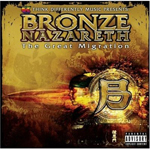|
|
 |
Dusted Reviews
Artist: Bronze Nazareth Album: The Great Migration Label: Babygrande Review date: Jul. 25, 2006 |

|
|
|
 |
If anyone's going to be the figurehead for the sprawling second and third waves of Wu-Tang Clan affiliates, it might as well be Detroit's Bronze Nazareth. After a handful of production credits on RZA's Birth of a Prince and elsewhere, he curated most of last year's excellent syndicate primer Think Differently Music: Wu-Tang Meets The Indie Culture, supplying both headliners (GZA, Del, Vast Aire) and obscurities (Littles, Tragedy Khadafi, himself) with beats vibrant and versatile enough to make RZA's own contribution to that album sound phoned in. The Great Migration is his solo debut (not counting an internet-only release with the ridiculously overblown title The Unknown - Death's Birth: The Grip of Behemoths), and with just a fraction of Think Differently's star power behind it, it's almost as good.
Migration is a lower profile record, but this works to its advantage. Its beats are less fierce, more laconic and bejeweled; it's a "producer's album," not in the euphemistic sense (i.e., "the rhymes are shitty"), but in the experimental one: you can hear Bronze tweaking his horns and straining the strings, subduing the beats to accommodate twinkling pianos and woozy Motown vocals, patiently pausing and rewinding to catch every fascinating noise. "Good Morning (A Nice Hell)" replaces the G-club edge of Dre's "Next Episode" sample with the sultry mood lighting of a 1970s detective show; "The Bronzeman" loops its beat for a good 50 seconds before anyone says anything, and somehow it's perfectly suspenseful.
He rhymes deftly enough, too: he lacks Inspectah Deck's flow or Ghostface's dizzying surrealism, but he's clever and articulate, intermittently political, and occasionally brilliantly nonsensical ("Like crashing planes into buildings I got explaining to do / These crooks took the art and ran like the stolen Van Gogh"). Still, one of Migration's greatest strengths is its cameos from familiar-ish names - Prodigal Sunn, Killa Sin, 12 O'Clock (ODB's brother!) and Byata, that recently unveiled Russian version of Foxy Brown - on roughly a third of its songs. This above all thickens the Wu-syndicate vibe, embracing the way everyone shows up all over without excessive fanfare, as it's been done since the mid-90s. "I'll probably never be as big as Slim Shady and Jay-Z / Even though I write vivid like I'm Homer the Greek," Bronze says with some venom in "Hear What I Say!" - but the scrappy community setting of Migration sounds like an assurance that he's got something more renewable, and probably less volatile, than blow-up fame anyway.
The final charm of Migration is that in no measure does it overextend itself: its tracks cut out curtly when nothing else needs to be said, or stick around longer than they should when they catch a groove too lush to relegate to a backdrop. Even the most pointless of the skits - an unedited clip from a scene in Tommy Boy where Chris Farley and David Spade elude the police by pretending to be attacked by vicious killer bees - is entertaining in its incongruence, where on a different record it would buckle under the stretch of the Wu-Tang Killa Beez association. Thanks to such indulgences, rather than in spite of them, The Great Migration shines, a comfortably charismatic and immensely promising display of potential.
By Daniel Levin Becker
|







